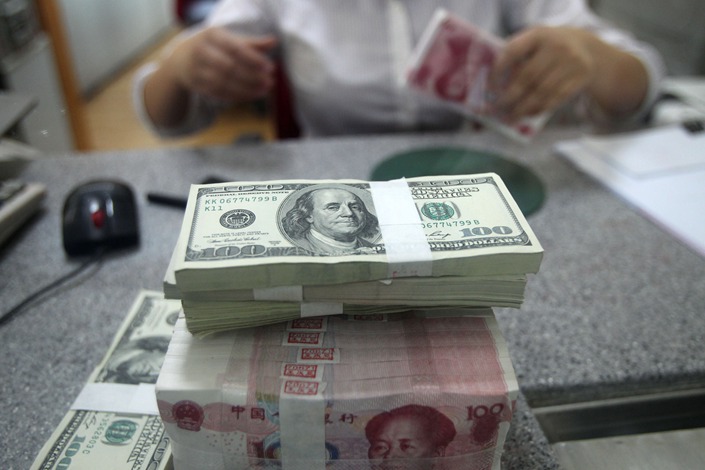
The yuan started to depreciate against the U.S. dollar in March. Compared to the two short rounds of depreciation in 2021, the new twist to the depreciation this time is that the CFETS RMB Index — which measures the value of the yuan against a basket of 24 currencies including the U.S. dollar and the euro — has fallen about 2.4% since its March high. Historically, when there was a significant drop in the exchange rate against the basket, the depreciation of the yuan against the U.S. dollar was unlikely to end soon.
The immediate trigger for the yuan depreciation was the narrowing of the spread between the short-term Chinese and U.S. government bond yields, as the U.S. began its interest rate hike cycle. Currently, the two-year and five-year Chinese sovereign bond yields are both lower than their U.S. counterparts, and the 10-year Chinese bond yield is essentially on par with the 10-year U.S. Treasury yield. From this perspective, it appears that the yuan’s depreciation has only begun.
While the narrowing of the U.S.-China spread essentially reflects the difference in strength between the U.S. and Chinese economies, the depreciation of the yuan is the result of China’s cyclical economic slowdown.
As the yuan has depreciated, overseas investors have started to ditch Chinese assets. In terms of bonds, they slashed their holdings of Chinese interbank bonds by nearly 200 billion yuan ($30.7 billion) in February and March, a record decline. In terms of stocks, a net 66 billion yuan of northbound capital — flows of offshore funds into the Chinese mainland stock market through a stock connect program — took flight from March 7 to March 25, an outflow comparable to that in March 2020, when the pandemic broke out globally.
Will the further narrowing of the U.S.-China spread trigger a new downturn in China’s onshore bonds and stocks? It depends on whether the depreciation of the yuan can boost China’s economic development.
Will Chinese government bond yields go up, following U.S. Treasury yields? That depends on the change in economic development in China and the U.S. If both the U.S. and Chinese nominal GDP growth rates rebound, Chinese government bond yields are likely to go up significantly. But if the U.S. nominal GDP growth rate keeps falling, even if the Chinese economy picks up, Chinese government bond yields will tend to fluctuate slightly.
It’s highly possible that the U.S. economy will gradually slow in 2022, and the improvement in the Chinese economy is looking increasingly uncertain amid the continuous Covid-19 outbreaks. At this point, it’s more likely that U.S. bond yields will top out sometime in the future, gradually widening the U.S.-China spread, while Chinese bond yields are unlikely to rise significantly.
Is it always the case that Chinese mainland stocks tend to fall when the yuan depreciates? Generally speaking, northbound funds only flow out in large amounts at the beginning of the yuan’s depreciation. When the yuan begins to depreciate steadily, northbound funds will flow in again and mainland stock prices will tend to rebound. The key reason for this is that the depreciation of the yuan is conducive to improving exports and the economy. In other words, overseas investors place more importance on corporate earnings prospects, while exchange rates and relevant gains and losses are of secondary importance.
The problems associated with economic slowdowns are different every time, and currency depreciation doesn’t always quickly and effectively stimulate economic development. As a result, the mainland stock market exhibited different performances when the yuan depreciated in the past. Whether the stock market can rebound in the future depends not on the trend of the yuan exchange rate, but on whether the downward trend of China’s economic growth can be reversed.
Xu Xiaoqing is director of macro strategy at Zhejiang province-based fund manager DH Fund Management Co. Ltd.
The article has been edited for length and clarity.
The views and opinions expressed in this opinion section are those of the authors and do not necessarily reflect the editorial positions of Caixin Media.
If you would like to write an opinion for Caixin Global, please send your ideas or finished opinions to our email: opinionen@caixin.com
Contact translator Zhang Yukun (yukunzhang@caixin.com) and editor Joshua Dummer (joshuadummer@caixin.com)
Get our weekly free Must-Read newsletter.







